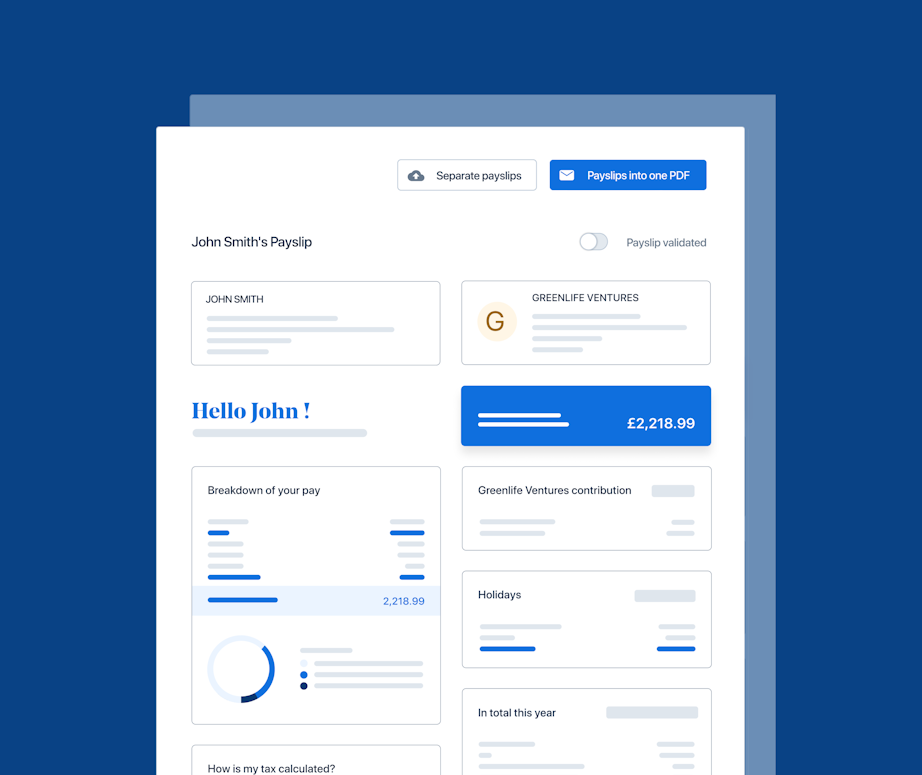Is AI Really Coming For Your HR Job?


We hope you’ll forgive the slightly dramatic headline, but it’s a question - amongst others - that we wanted to try and answer. This is in response to IBM’s CEO Arvind Krishna telling Bloomberg News that his firm expects to pause hiring for new roles, at the same time as replacing around 7,800 jobs with AI.
Hiring for back-office functions, including HR, will be slowed or suspended, he said, with up to 30% of non-customer-facing roles potentially being replaced by AI or automation within five years.
It’s not a new topic by any means, with countless articles out there talking about AI in HR. We here at PayFit are very much in the ‘AI can support, rather than replace, HR job functions’ camp, and are huge advocates for the power of automation to help humans do their jobs more efficiently and free up time for truly impactful, strategic work.
We believe that AI technology can be leveraged in HR for good, to help streamline and support processes for much improved human outcomes.
For this piece, we spoke to a few of our partners in the HR space for their thoughts on AI and HR and what the future of AI in HR might hold. You’ll find their thoughts alongside our musings on the benefits and disadvantages of AI in HR, how we got to where we are today and where we may go next.
AI and HR: how we got here
The origins of the HR function - and perhaps even AI and machine learning in HR - can be traced back to the Industrial Revolution in the mid 19th century, when large swathes of the workforce swapped textile manufacturing at home for days spent in factories as part of a larger network of workers instead.
Such a rapid change in working conditions necessitated an organised system of managing staff, serving as a bridge between them and the business owners. HR in the early days was very much a process-driven department - responsible for hiring, firing and enforcing rules.
Jobs undertaken in family units at home and by hand for many years were transformed by mechanised mass production, with the advent of machinery such as the steam engine and the power loom rapidly reducing the amount of time taken to make and transport things.
If that particular development sounds familiar, that’s because it is! Technology has been caught up within the formation and development of the HR function from the very beginning. Rather than overtake humans, technology helped them do their jobs better. And we feel the same thing is happening today.
Conversely, the HR department of today is multi-faceted, strategic, and of huge importance for retaining, developing and recruiting the very best talent, to maintain a competitive edge over rivals. It’s for these reasons that many of the process-driven tasks within HR have been automated, allowing managers to focus more on the strategic initiatives that will give them that competitive advantage.
Let’s take a look at some of the numbers on how AI and HR are already existing side-by-side in harmony, and what the future of AI in HR might look like:
A majority of 250 HR leaders surveyed said they are already using AI across HR functions - including for employee records management (78%), payroll processing (77%), recruitment (73%) and performance management (72%)
The same survey found that 92% of HR leaders intend to increase their use of AI in at least one area of HR, with performance management (43%) coming out on top. Payroll processing and benefits administration came a close second, with 42% of respondents saying they were looking to AI to improve processes.
Most plan to increase their usage in as little as 12-18 months’ time.
So as we can see…there are many benefits of AI in HR, with leaders responding positively and proactively to developing technologies that will help them do their jobs that little bit smarter. But there are some ethical considerations - in other words, some disadvantages of AI in HR, that are worth covering too.

So what are the benefits of AI in HR? And what are the disadvantages?
‘With the latest advances in AI technology, we’ll be able to solve problems in ways we haven’t been able to before’.
This is according to Christian Eggert, Head of Product at the all-in-one HR solution software Personio, one of our partners. He continues: ‘but we have to ensure we keep both HR in control and the human touch for employees. It has the potential to be an amazing advancement of the HR function and employee experience in general.' This encapsulates the fine balance between empowering managers and staff with technology, and replacing them with machines. Broadly speaking, the benefits of AI in HR outweigh the downsides. And they include:
Less time spent on repetitive tasks = more time spent on those big strategic one-offs
An improved onboarding experience for new staff
Training resources and strategies at your fingertips
A dramatic reduction in errors around business-critical processes, including payroll.
Streamlined screening and pre-employment checks
Having said all of this, AI is far from flawless. Not only does it have its limitations, but also its ethical considerations.
The first that comes to mind is that of data privacy, a key tenet of the HR discipline as a whole. After all, employee data security - including that of bank details, personal addresses and annual leave records - is paramount, and there is the argument that allowing AI access to all of this could potentially compromise that security.
AI, by its very nature, dehumanises HR processes. So if one of the benefits of AI in HR is the automation of laborious manual tasks, then one of its drawbacks must surely be the fact that it is removing a certain degree of the human from human resources.
One such example of this is Amazon’s AI recruiting tool, which was found to be biassed against women. Another instance is that of remote surveillance software, used to keep tabs on remote workers, amidst cries of ‘Big Brother’ and the invasion of worker privacy.
The long and short of it is that, in the right hands, AI can be a powerful tool to bring out the best in humans, but that its implementation must be handled with care and consideration.

What does the future of AI in HR look like?
Personio’s Chief People Officer, Ross Seychell, believes that the human element of human resources will mean that whilst the future of HR is one that involves AI, it will not be its sole driver.
In addition to the processes we have already spoken about, there are other areas of HR that AI could become more prevalent in in the future.
Hiring - AI will likely play a bigger role in the recruitment process, providing smarter insights into the skills and experience of candidates, lessening the manual task of sifting through hundreds of CVs and highlighting the top five or so candidates to progress to interview.
Dismissal - This is something that Amazon has already been trialling, but algorithms will likely be able to find new factors to decide whether or not somebody should be put on performance review, or ultimately dismissed.
Employee engagement - The expansion of chatbot technology within workplaces, rather than simply as a customer service tool, will enable staff to speak with a bot in order to raise concerns or challenges, and to find a quick solution without the need for human input. This could potentially free up managers’ time that they would’ve previously spent addressing frequently occurring problems.

Why humans will always be essential in HR
Taking into account the benefits that AI provides - and will continue to provide in the future - it’s only natural for HR professionals to feel a little worried that they could eventually be replaced.
But to think this way would be to do down all of the incredible value that HR professionals bring to the table from a human perspective.
After all, the clue as to why the humans of HR aren’t about to be replaced by robots is in the name - human resources.
‘HR is “human“ resources for a reason’, states Ross Seychell. He goes on to say that whilst ‘there are many efficiencies that AI technology can provide for HR teams…its impact on strategies around bigger topics is limited’.
And this is the crux of what the HR role has become since its foundations all those years ago, and what it continues to be. That is, a truly strategic business function that sits at the heart of all well functioning organisations.
Strategic in the sense that it is central to developing recruitment, retention and development strategies; that it should be identifying key areas for workforce development, and thus helping businesses to achieve their wider objectives.
It is our firm belief that HR workers and leaders will be increasingly called upon to utilise their more 'human' qualities in their roles to support employee wellbeing, mental health and welfare in an increasingly uncertain world.
Arguably, the full potential of AI in HR will never be realised unless it is human-led.
And so to end with some fitting words from Ross Seychell...
‘The C-suite is short-sighted if they think that this is a case of replacement - instead it should be more about empowerment.’







